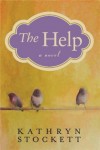Kathryn Stockett’s debut novel, The Help (Amy Einhorn Books, 2009), is ambitious. It’s historical fiction. It deals with race relations. It’s 444 pages long.
But, despite this daunting setup, Stockett’s book reads like a stroll in the park rather than a Matterhorn ascent. The author paces herself. She crafts her characters, taking her time to let them tell their stories. Help reveals itself, its purpose, slowly—but the narrative is immediately engaging and quickly addictive. Those 444 pages? This reader polished them off in four days.
Help, set in Jackson, Miss. during the early 1960s, is told from three perspectives: Aibileen and Minnie who are both “domestics”—African-American women hired to keep house, cook, care for the children and any other tasks their white employers think up—and Skeeter, a white woman just out of college who dreams of being a journalist.
All three characters are outsiders to a degree. Aibileen is levelheaded and wants to keep the peace, but after her only son is injured as a laborer and then dies as a result of neglect from his white employer, she feels “a bitter seed was planted inside me. And I just didn’t feel so accepting anymore.”
Minnie, on the other hand, is hot-tempered. Her downfall is her sharp tongue. Though she knows that talking back to the women for whom she works will lead to no good, she just can’t help herself (“Why I got to handwash when the power washer gone do he job? That’s the biggest waste a time I ever heard of”), and as a result has been fired 19 times in the same town.
Skeeter was raised by a black maid, a woman more loving and understanding than Skeeter’s own mother. Though Skeeter—tall and awkward—often felt a misfit, her maid Constantine seemed to accept her unconditionally. However, Skeeter returns from college to learn that Constantine was let go, with no further explanation. Meanwhile, Skeeter’s childhood friends have all become wives and mothers and busy themselves bossing around maids of their own while campaigning for every white family’s home to have a separate bathroom for the black employees so that the two races never need share a toilet seat. (Of this, Aibileen muses, “…Miss Leefolt’s building me a bathroom cause she think I’m diseased. And Miss Skeeter asking don’t I want to change things, like changing Jackson, Mississippi, gone be like changing a lightbulb.”)
Through a chain of events, the three women find themselves drawn together on a secret project that will reveal the never discussed relationships between the towns black and white women who live and work side by side and yet never truly know one another.
Stockett tells her story, at least those sections narrated by Aibileen and Minnie, in dialect: “At noontime, we all three get in Miss Leefolt’s blue Ford Fairlane. On the back set next to us, I got a bag with a Thermos a apple juice, cheese nabs, peanuts, and two Co-Cola bottles that’s gonna be like drinking coffee they gone be so hot.” For this reader, dialect is often a poor choice. Odd spellings, assumed colloquialisms and unfamiliar vernacular tend to be distracting, pulling the reader out of the flow of the narrative to make sense of the dialog. This is not the case with Help. Stockett utilizes the dialect of the housekeepers to her advantage, her word choices don’t detract from the flow, and in a matter of pages the reader no longer notices (except for humorous instances: Aibileen tells Skeeter that the trick to keeping dogs out of the trash is to “Just pour some pneumonia in that garbage”).
What’s impressive and moving about Help is that it serves to remind us that the Civil Rights Movement was just gaining steam 50 years ago. Today, in 2009, we’ve elected an African-American president. We don’t use separate rest rooms or busses or lunch counters. And yet, to get from that mind set circa 1962 to our 2009 outlook was a steep learning curve. Help addresses this, but it’s all in the minor details, the daily minutia: “‘Don’t forget the turkey, now,’ Miss Leefolt say. ‘And two cans of cranberry sauce.’ I smile. I only been cooking white Thanksgiving since Calvin Coolidge was President.”
But as momentous and important as this novel feels, it’s also warm and fun and often funny. Skeeter, the reluctant heroine, manages plenty of zingers in the face of cruelty from her former country club friends: “‘And you call yourself a Christian,’ were Hilly’s final words to me and I thought, God, When did I ever do that?”
Kathryn Stockett will read from and discuss The Help at Malaprop’s on Friday, March 13. The 7 p.m. event is free.
—Alli Marshall, A&E reporter



Great review, Alli. Several people have suggested this novel to me, including my mom. I’m looking forward to reading it.